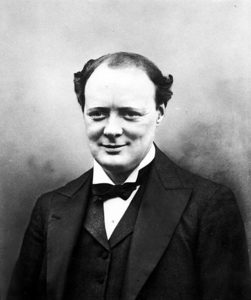Churchill on the Century

Who here is in their Forties? Are you as pessimistic as he was?
Winston Churchill was 48 when he penned some “Reflections on the Century,” which may arrest you with their prescience—and their eerie relevance.
His words below are in his original “speech form.” This is the way they were set out on the notes he carried with him, however well he memorized his lines. They appear in this style in my collection of quotations, Churchill by Himself, but differ from the way you may have encountered them in other books:
What a disappointment [this] century has been.…
We have seen in ev[ery] country a dissolution,
a weakening of those bonds,
a challenge to those principles,
a decay of faith
an abridgement of hope
on wh[ich] structure & ultimate existence of civilised society depends.
We have seen in ev[ery] part of the globe
one g[rea]t country after another
wh[ich] had erected an orderly, a peaceful, a prosperous structure of civilised society,
relapsing in hideous succession into bankruptcy, barbarism or anarchy.
Can you doubt, my faithful friends
as you survey this sombre panorama,
that mankind is passing through a period marked
not only by an enormous destruction & abridgement of human species,
not only by a vast impoverishment & reduction in means of existence,
but also that destructive tendencies have not yet run their course?
And only intense, concerted & prolonged efforts
among all nations
can avert further & perhaps even greater calamities?”
One might think these the words of some modern Cassandra, speaking about the 21st Century. But no, it is Churchill, ninety-four years ago, at a similar juncture in the century before—the 20th. We may debate whether things now are quite as forbidding as his description then. In 1922, “greater calamities” were indeed coming.
Churchill’s Political Philosophy
Churchill was a seasoned thinker by then, Sir Martin Gilbert tells us. Not yet fifty, he could look back on two decades of public life. For much of that time, he had been an active participant at the centre of policymaking, arguing his points with men of experience and expertise, testing his ideas amid the daily pressure of departmental business, and reflecting, with each year, on the evolution of the world scene, and the nature of man.”
He had evolved what Gilbert described as “three interwoven strands” of political philosophy: “the appeasement of class bitterness at home, the appeasement of the fearful hatreds and antagonisms abroad, and the defence of Parliamentary democracy and democratic values….” To achieve these, his method was “conciliation…the path of moderation. But where force alone could preserve the libertarian values, force would have to be used. It could only be a last resort—the horrors of war, and the very nature of democracy, ensured that—but in the last resort it might be necessary to defend those values by force of arms.”*
“These reflection were sometimes sombre,” Sir Martin added. They are perhaps no less sombre a century later.
_____
- Martin Gilbert, Churchill’s Political Philosophy (London: British Academy, 1981), 83.






